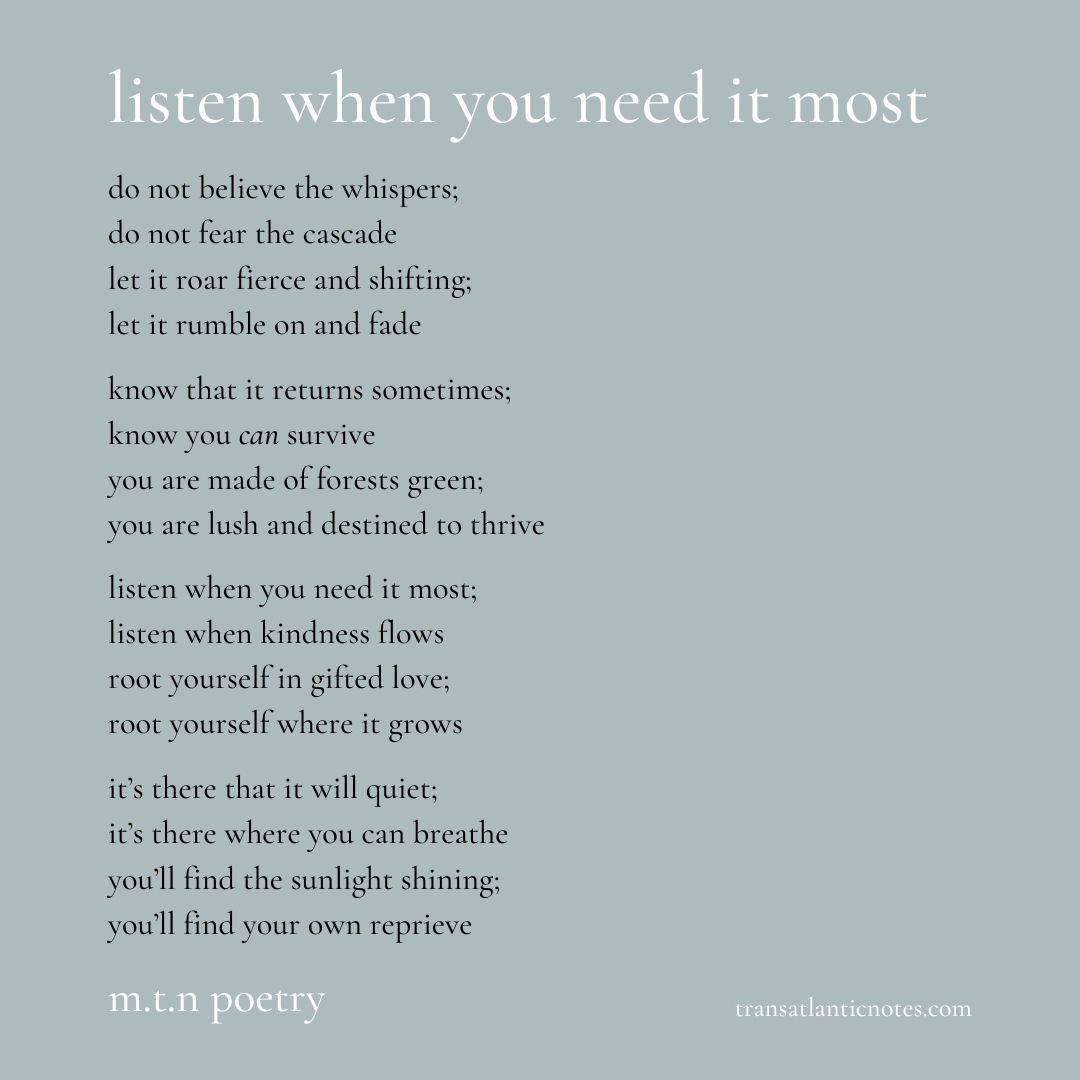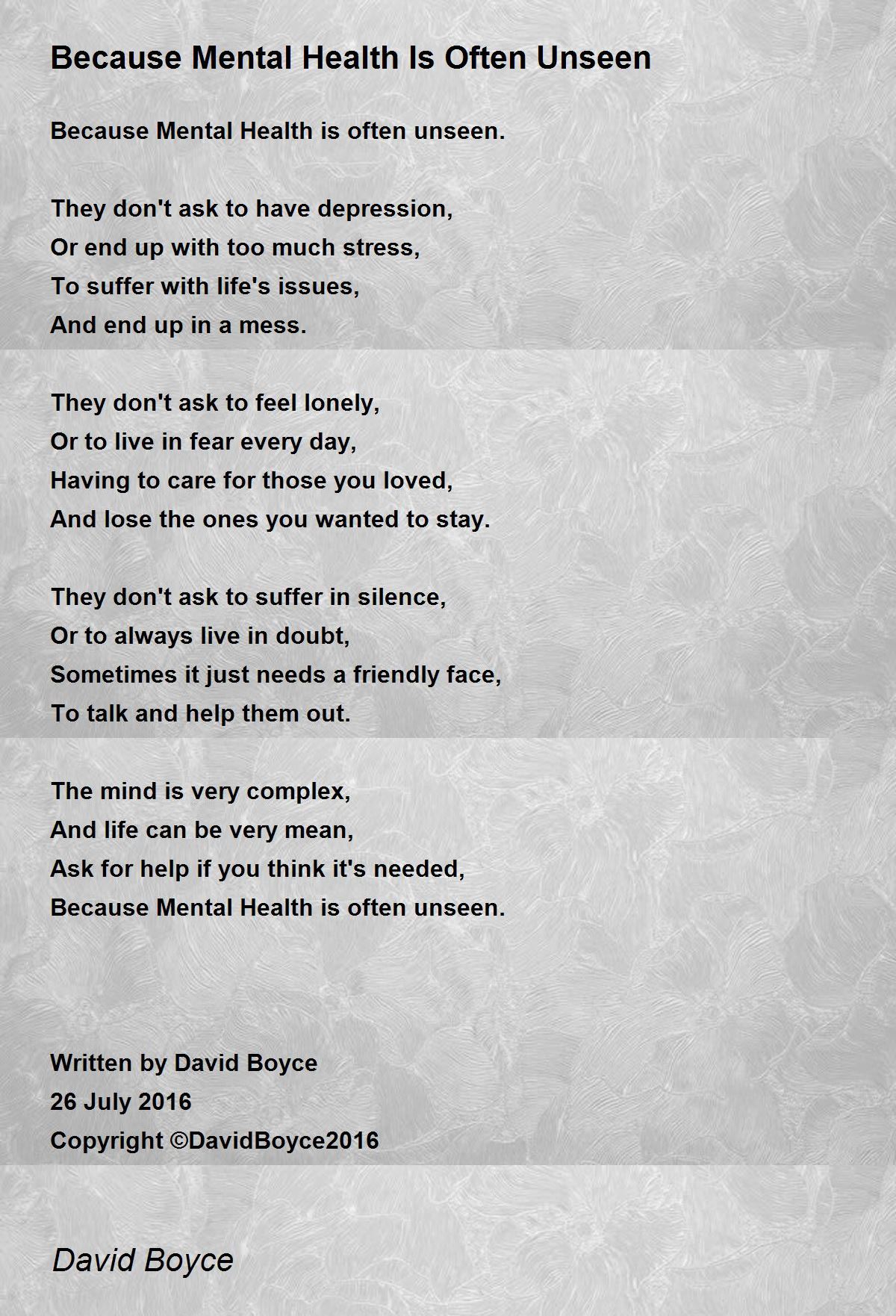What role do poetry and language play in your understanding of mental health?

This image is property of transatlanticnotes.com.
The Power of Poetry in Mental Health
Poetry has a unique way of connecting deeply with our emotions. It serves as a refuge for those grappling with mental health challenges. When it comes to articulating feelings of anxiety, depression, or even hope, words can transform the chaotic noise in our minds into something tangible and relatable. Engaging with poetry is like having a heart-to-heart conversation with yourself, often shining a light on what you may be experiencing but finding hard to articulate.
Understanding Mental Health Through Verses
It might be surprising, but poetry has been used for centuries as a medium to explore the complexities of human emotions. Whether you’re dealing with the quiet whispers of anxiety or the overwhelming weight of depression, poems can speak to your innermost thoughts in a way that feels profoundly intimate. You might find that reading or writing poetry can reveal truths about your feelings that you hadn’t fully recognized before.
Mental Health and Emotional Expression
When it comes to emotional expression, poetry can serve as both a mirror and a window. It reflects your own experiences while also allowing you to glimpse into others’ realities. Through carefully chosen words, poets create an amalgamation of feelings that resonate with you, making it a powerful tool for self-discovery and understanding.
Why Poetry Resonates
You may wonder, what is it about poetry that resonates so deeply when discussing mental health? The answer lies in its ability to condense complex emotions into a few carefully chosen words. Unlike prose, poetry thrives on brevity and metaphor, forcing both the writer and reader to pause and contemplate. This is particularly beneficial for someone navigating mental health struggles, as poetry can encapsulate nuances that prose may overlook.
The Role of Metaphor
Metaphors can be incredibly impactful; they can illustrate feelings that are otherwise hard to describe. For instance, describing depression as a heavy blanket suffocating you provides a visual and emotional context that many readers can instantly recognize. In this way, poets can create a shared language around experiences that often feel isolating.
Writing Your Own Mental Health Poems
If you’re feeling inspired to pen your own thoughts and emotions into poetry, you may not know where to start. Here’s a handy guide to help you express your feelings creatively.
Finding Your Theme
The first step in writing a poem is selecting a theme. What mental health topic weighs on your mind the most? It might be anxiety, isolation, or even the quiet moments of relief you encounter. Identifying a central theme will help focus your thoughts and direct your writing.
Tips for Choosing a Theme
- Journaling: Start by writing down your thoughts. Reflect on what you feel most strongly about.
- Free Writing: Set a timer for 10 minutes and write without stopping. Afterward, look for recurring phrases or ideas that could serve as your theme.
- Visual Prompts: Sometimes an image, a color, or a particular memory can spark an idea. Consider looking through photographs or artwork for inspiration.
Structuring Your Poem
Once you’ve chosen a theme, consider how you want to structure your poem. Will it be a sonnet, haiku, or free verse? You might not need to stick to strict forms, especially if you’re new to writing poetry. Free verse allows your words to flow naturally without worrying about rhyme or meter.
Popular Poetic Structures
| Structure | Description |
|---|---|
| Haiku | A three-line poem with a syllable structure of 5-7-5. Often focuses on nature or moments of insight. |
| Sonnet | A 14-line poem typically written in iambic pentameter, expressing a single theme or idea. |
| Free Verse | Poetry without a fixed pattern or rhyme scheme, allowing for greater freedom of expression. |
Crafting Your Words
When writing your poem, use vivid imagery and concrete details. The more specific you can be, the stronger your poem will resonate. Allow yourself the freedom to express raw emotions without self-judgment.
Embracing Vulnerability
It’s normal to feel vulnerable when writing about personal experiences. However, honesty in your work often leads to the most impactful poems. Don’t hesitate to share your feelings. They are valid, and in expressing them, you may discover both clarity and connection.
Poems That Speak to Mental Health
Here are a few poems that may resonate deeply as they touch on mental health themes. They offer varied perspectives on struggles, recovery, and hope.
“The Peace of Wild Things” by Wendell Berry
This poem encourages you to embrace nature as a form of healing. The imagery invites you to find solace in the wild, emphasizing the importance of stepping back and allowing yourself to breathe amidst chaos.
Themes:
- Nature as a refuge
- Finding peace in simplicity
“Still I Rise” by Maya Angelou
Angelou’s empowering words shine a light on resilience. The poem speaks to overcoming adversity and standing tall against life’s difficulties. It’s a reminder that, despite the struggles faced, there is always a path forward.
Themes:
- Resilience
- Empowerment and strength
“The Guest House” by Rumi
This poem metaphorically describes the mind as a guest house, welcoming in both joy and sorrow. It advocates for embracing all emotions, treating them as visitors that teach us about ourselves. This approach invites radical acceptance of your feelings, which can be incredibly freeing.
Themes:
- Emotional acceptance
- Transformation through experience
The Role of Poetry Therapy
Engaging with poetry doesn’t just have to be a solitary experience. Poetry therapy has gained traction as a therapeutic approach for mental health. It combines the creative process of writing poems with psychological principles, offering individuals a safe space to express their emotions.
How Poetry Therapy Works
In poetry therapy, a trained facilitator guides you through the writing process, often incorporating specific prompts to help unlock feelings you might not even realize are there. This approach can be particularly effective for those who find verbal communication challenging but can articulate complex emotions through writing.
Benefits of Poetry Therapy
- Emotional Release: Writing poetry can help you articulate emotions that might be too difficult to talk about.
- Self-Discovery: It encourages introspection, allowing you to understand your thoughts and feelings more deeply.
- Therapeutic Community: Sharing poetry with others can create a sense of belonging and support.
Finding a Poetry Therapist
If you’re interested in exploring poetry therapy, look for qualified facilitators in your area. Many therapists specialize in creative arts therapies, and they can offer personalized approaches that meet your needs.

This image is property of 64.media.tumblr.com.
The Impact of Shared Poetry
Sharing your poetry, whether in a group setting or with a trusted friend, can be a transformative experience. It cultivates a sense of community, allowing you to feel less isolated in your struggles. The act of sharing can also empower others to speak up about their experiences.
Creating a Poetry Circle
Consider forming a poetry circle with friends or acquaintances who might also be interested in exploring mental health through poetry. You can meet regularly to share your writing, provide feedback, and discuss the feelings that arise as you engage with each other’s work.
Benefits of Group Sharing
- Validation: Hearing others’ experiences can validate your own feelings.
- Support Network: A poetry circle fosters a safe space for growth and encouragement.
- Creativity Boost: Engaging with others’ work can inspire your writing and broaden your creative horizons.
Reading Poems for Mental Health
In addition to writing, reading poetry can be an excellent way to reflect on mental health. It invites you to consider your own thoughts and emotions through the lens of another person’s experience.
Recommended Poets and Collections
Here are some poets and collections that explore themes of mental health and emotional resilience that you might find meaningful:
| Poet/Collection | Description |
|---|---|
| Rupi Kaur – “Milk and Honey” | This collection addresses themes such as love, loss, and healing in a raw and accessible manner. |
| Ocean Vuong – “Night Sky with Exit Wounds” | A powerful exploration of identity, trauma, and the intricacies of family dynamics. |
| Sylvia Plath – “Ariel” | Plath’s work often explores themes of depression, identity, and the struggle for self-understanding. |
How to Engage with Poetry
When reading poetry, take your time. Let the words roll around in your mind. You might find that certain lines resonate with you particularly strongly. Consider keeping a journal to jot down your thoughts and any personal reflections that arise while reading.

This image is property of img.poemhunter.com.
Conclusion: Poetry as a Path to Healing
Ultimately, poetry serves as a powerful tool for introspection and healing. By writing and engaging with poetry, you create space to explore your feelings in a way that can lead to greater understanding and acceptance. It’s a reminder that you are not alone in your experience, but rather part of a rich tapestry of human emotion and resilience.
Your Journey with Poetry
So, what will your journey with poetry look like? Whether through writing, reading, or sharing, you can find comfort and connection. Remember, your voice matters. It’s time to let your words flow freely, creating not just poetry but an avenue for healing within yourself. Allow poetry to guide you through the intricacies of mental health, and by doing so, you’ll perhaps uncover something profoundly beautiful in both the process and the outcome.